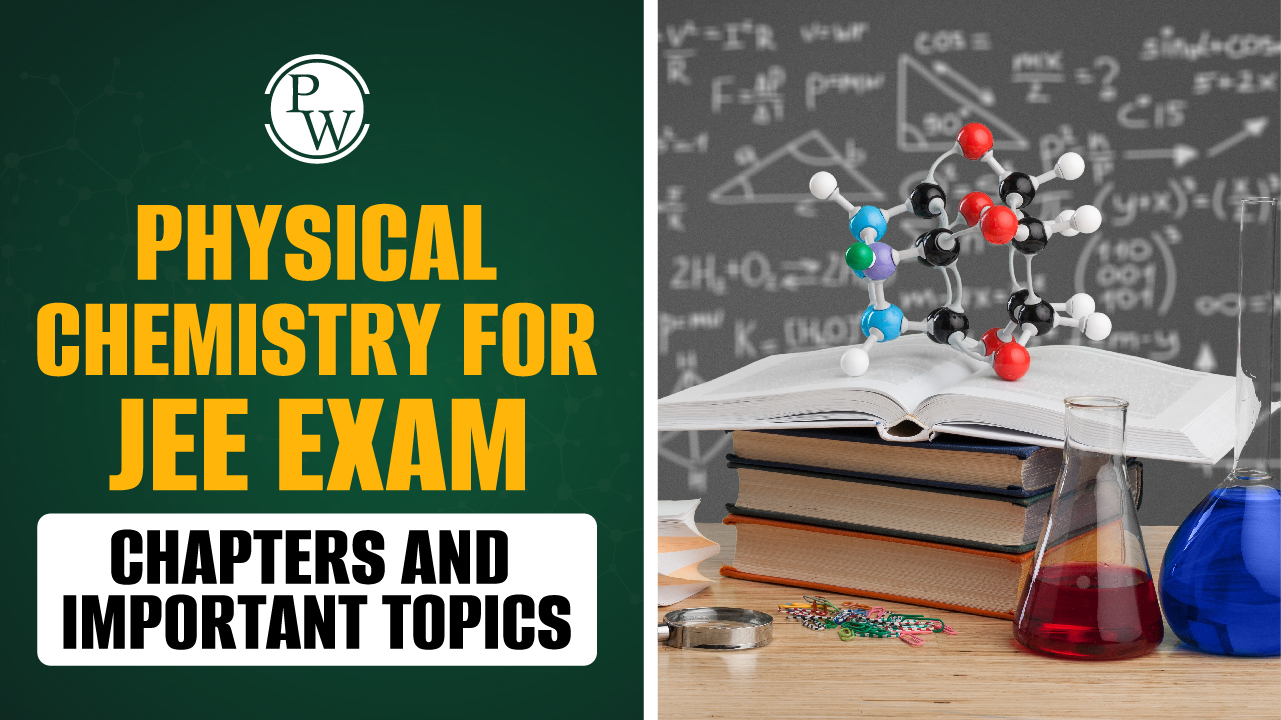Physical Chemistry for JEE Exam: Chapters and Important Topics

Physical Chemistry Chapters for JEE Exams are very important and cover a big part of the overall JEE Chemistry Syllabus. Many aspirants who prepare for the Joint Entrance Examination feel that Chemistry helps them score better because it is not as lengthy or challenging as Physics or Mathematics. Chemistry in JEE is more about understanding the concepts clearly and remembering the right formulas. That’s why, if studied properly, it can be your rank booster in the upcoming JEE exam.
Physical Chemistry topics for JEE include formulas, concepts, and calculations. It covers topics like the mole concept, thermodynamics, equilibrium, and more. Unlike Organic or Inorganic Chemistry, Physical Chemistry is more about understanding and applying logic. Keep reading to find important Physical Chemistry Chapters for JEE.
Check Out: IIT JEE Books
What is Physical Chemistry?
Physical chemistry is the part of Chemistry that explains how and why chemical reactions happen. It connects Chemistry with Physics to help us understand how atoms and molecules behave.
So the answer to the commonly asked question, “What is Physical Chemistry?” is that “It tells us about the energy changes, speed of reactions, and how matter behaves at the atomic level.” Many JEE questions come from chapters you learned in classes 11 and 12.
-
Physical Chemistry Chapters Class 11 include the basic and foundational topics like mole concept, atomic structure, thermodynamics, states of matter, and equilibrium. These chapters are important because they teach you how to solve numerical questions and understand the logic behind chemical reactions.
-
Additionally, Physical Chemistry Chapters Class 12 covers more advanced topics such as solid state, solutions, chemical kinetics, electrochemistry, and surface chemistry. These chapters explain how fast reactions happen, how substances behave under different conditions, and how energy is transferred in a reaction.
If your understanding of Physical Chemistry topics is good, it becomes easier to solve JEE questions correctly. Let's now go through the complete list of Physical Chemistry Chapters for JEE and important topics from both classes, so you can plan your study better.
Check Out: JEE Revision Books
Important Physical Chemistry Chapters and Topics
When it comes to JEE preparation, knowing the important physical chemistry chapters can save a lot of your time. You don’t need to study everything with the same focus. Some chapters are more important than others because many questions are asked about them in past exams.
Both Physical Chemistry Chapters Class 11 and Class 12 cover different concepts that are equally important for building a strong base and solving numerical problems. Class 11 chapters focus more on basic understanding and theory, while Physical Chemistry Chapters Class 12 go deeper into how reactions take place and how fast they occur.
Based on previous years' JEE question papers, here are some of the most important Physical Chemistry Chapters, along with topics under them from classes 11 and 12:
1. Some Basic Concepts of Chemistry
-
Mole Concept: 1 mole = 6.022 × 10²³ particles (Avogadro’s number)
-
Stoichiometry: Calculating reactants and products; balancing chemical equations
-
Laws of Chemical Combination:
-
Law of Conservation of Mass
-
Law of Definite Proportions
-
Law of Multiple Proportions
-
Atomic and Molecular Masses: Relative atomic mass, molecular mass, and mass spectrometry
-
Empirical and Molecular Formulas: Finding the simplest ratio and actual number of atoms in a compound
2. States of Matter
-
Gases: Ideal gas law, behavior of real gases (pressure, volume, temperature)
-
Liquids: Viscosity, surface tension, vapor pressure
-
Solids: Crystalline and amorphous solids, unit cells, crystal lattices, melting point, hardness
-
Intermolecular Forces: Dipole-dipole forces, London dispersion forces, hydrogen bonding
-
Subatomic Particles: Protons, neutrons, electrons — their discovery and properties
-
Atomic Models: Thomson’s, Rutherford’s, and Bohr’s models
-
Quantum Mechanical Model: Quantum numbers, orbitals, orbital shapes, electron configuration
-
Electronic Structure: Aufbau principle, Pauli’s exclusion principle, Hund’s rule
4. Chemical Thermodynamics
-
First Law of Thermodynamics: Energy conservation, internal energy, and enthalpy
-
Second Law of Thermodynamics: Entropy, spontaneity, Gibbs free energy
-
Enthalpy Changes: Enthalpy of reaction, formation, and combustion
-
Calorimetry: Measuring heat changes during chemical processes
5. Equilibrium
-
Dynamic Equilibrium: Reversible reactions and equilibrium in closed systems
-
Le Chatelier’s Principle: Effects of changing concentration, temperature, or pressure
-
Equilibrium Constant (K): Kc and Kp calculations for chemical equilibria
-
Acid-Base Equilibria: pH, pOH, Ka, and Kb values for weak acids and bases
-
Solubility Equilibria: Solubility product constant (Ksp) and related calculations
6. Redox Reactions
-
Oxidation and Reduction: Definitions and examples of oxidizing and reducing agents
-
Oxidation Numbers: How to assign oxidation states and balance redox equations
-
Electrochemical Cells: Galvanic and electrolytic cells, electrode potentials, Nernst equation
Check Out: JEE Study Material
How to Prepare Physical Chemistry Topics for JEE
When you understand the logic behind chemical changes in Physical Chemistry, solving questions feels easier. In JEE, Physical Chemistry can give you an edge because the questions are mostly direct and scoring. But many aspirants get confused between theory and numericals, or they jump straight to solving questions without learning the basics.
So here are a few tips on how you can prepare Physical Chemistry Topics for JEE, starting with Class 11 and then Class 12:
Tips to Study Physical Chemistry Chapters Class 11
When you enter Class 11, the topics in Chemistry are simple and basic. But they are also the foundation of Physical Chemistry. If your base is clear here, you’ll find Class 12 much easier to handle. So here are some helpful tips on how to study Physical Chemistry Chapters Class 11:
-
Start with concept-building. Try to understand every formula. Don’t just memorize it. Most formulas in Class 11 Physical Chemistry are based on basic logic.
-
Use a rough notebook to solve at least 5 to 10 numericals every day. Practice is the only way to get better at solving speed-based questions.
-
Make small flashcards or summary notes of common definitions, units, and conversions. These help a lot during quick revision.
-
Focus on one topic at a time. Don’t try to jump between chapters, or you may miss important links between concepts.
-
Revise regularly. Even if you studied a topic last month, take 10 minutes every weekend to go over it again.
Tips to Study Physical Chemistry Chapters Class 12
Class 12 topics are more advanced. But if you’ve done your Class 11 chapters properly, you’ll find them easier to connect and solve. Here's how to study Physical Chemistry Chapters Class 12 better:
-
Pay extra attention to formulas and graphs. Many Class 12 Physical Chemistry questions are based on interpreting graphs or applying formulas correctly.
-
Don't skip theory. Even though you are good at numericals, theory-based questions are asked often in JEE.
-
After learning a topic, test yourself by solving 5 questions from previous years' JEE papers. This builds confidence and shows what types of questions are asked.
-
Study with understanding, not pressure. Many students feel that Class 12 topics are tougher, but they are actually more scoring if you practice daily.
-
Make a revision notebook where you write down all shortcuts, important formulas, and tricky questions you come across. This will help in boards as well as in JEE exams.
After you’ve gone through all the NCERT Physical Chemistry Chapters, you need proper revision material to keep everything fresh in your mind. That’s where the Chapterwise JEE Handwritten Notes for Physical Chemistry can really help.
-
These Handwritten Notes For Physical Chemistry are written in a very simple and classroom-style way, with Hindi dialogues to make learning easier to understand.
-
You get 1200+ topic-wise questions, solved examples, PYQs, and a common mistakes section that helps you avoid silly errors.
-
Plus, all formulas are clearly written for quick revision.
-
It covers the complete syllabus for both JEE Main and Advanced in one place.
This kind of study material to prepare for Physical Chemistry Chapters can boost your daily practice and enhance your overall JEE preparation smartly.
Check Out: JEE Main 7 Years (2019 - 2025) Chemistry PYQs
Physical Chemistry Applications
Physical chemistry is not just useful for JEE exams. It also has many real-life applications in science, industry, and medicine. Check some important fields where physical chemistry plays an important role:
-
Catalysis and Medicine: Physical chemistry helps in making better catalysts and also in designing new medicines by controlling how fast reactions happen.
-
Energy and Industry: It improves the efficiency of machines and chemical factories by using energy in a smarter way.
-
Material Science: With the help of physical chemistry, scientists create materials that can handle high heat or cold.
-
Quantum Chemistry: This helps in understanding the structure of molecules and is used in labs for molecular modeling.
-
Electrochemistry: It is used in making better batteries and fuel cells, and to stop things like the rusting of iron.
-
Surface Chemistry: This helps in making paints, coatings, and cleaning materials more effective by improving how they stick or react on surfaces.
-
Spectroscopy: Used in medical tests and to study the structure of different molecules.
-
Statistical Mechanics: Helps in predicting how gases or liquids behave, especially when their temperature or pressure changes.
-
Electronics and Biomaterials: Physical chemistry helps in making semiconductors for computers, and also materials used in medical equipment.
-
Environment: It plays a role in water purification, air quality testing, and even in studying climate change.
-
Biophysics: Helps in understanding how enzymes work and how proteins fold inside the body.
Also Read: Is It Difficult to Score 150 in JEE Mains?
Physical Chemistry for JEE Exam FAQs
Q.1. Is Physical Chemistry important for JEE?
Ans. Physical Chemistry is very important for both JEE Main and Advanced. Many questions are asked about it as it includes formulas, numericals, and direct concepts.
Q.2. How to study Physical Chemistry to score well?
Ans. To score well in Physical Chemistry, start by understanding the basic concepts from classes 11 and 12. Learn theory and then solve numerical problems. Make short notes of formulas and practice questions as per the JEE level.
Q.3. Can I skip theory and focus only on numericals in Physical Chemistry?
Ans. No, you should not skip theory. Many questions in JEE are concept-based or come from theoretical parts. First, understand the theory and then move to the numericals to get a better grip on the topic.
Q.4. How many Physical Chemistry questions are asked in JEE?
Ans. In the JEE Main exam, about 12 to 15 questions generally come from Physical Chemistry. The Chemistry section has 25 questions in total, and the rest are from Organic and Inorganic Chemistry.
Q.5. Can I skip Physical Chemistry Chapters Class 11 and prepare only from Class 12?
Ans. Physical Chemistry Chapters Class 11 builds your basics. If you skip them, it will be hard to understand Class 12 topics properly. Both Class 11 and Class 12 Physical Chemistry topics are important for JEE.

![JEE Advanced EaJEE Handwritten Notes For Inorganic Chemistry By Om Pandey | Chapterwise and Topicwise Questions | Complete JEE Main & Advanced Syllabus | Handpicked PYQs [Paperback] Om Pandey](https://static.pw.live/7ad2ddc0-3b23-4e89-bce9-64275f276aa2.png)









